Seminar on "Ummah and the Concept of Unity in the Light of Islamic Teachings"
December 27, 2014 at IOS Conference Hall
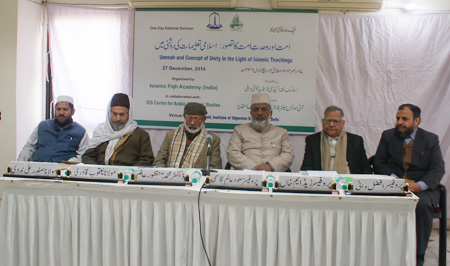
L-R: Maulana Safdar Zubair Nadwi, Maulana Yaqoob Qadri, Dr. M. Manzoor Alam, Prof. Saud Alam Qasmi, Prof. ZM Khan, Prof. Afzal Wani
The Islamic Fiqh Academy (India), in association with the IOS Centre for Arabic and Islamic Studies, organised a one-day national seminar on Ummah and the Concept of Unity in the Light of Islamic Teachings at the conference hall of the Institute of Objective Studies on December 27, 2014. Presiding over the seminar, the Chairman of the IOS, Dr. Mohammad Manzoor Alam held that difference of opinion opened the window of mind.
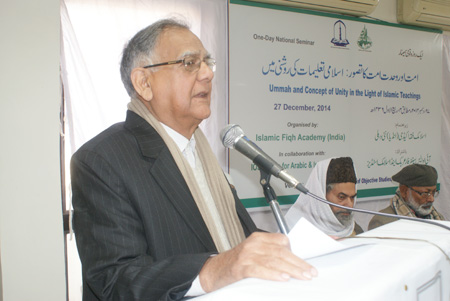
Speaker: Prof. ZM Khan
"Unfortunately, unlike dissent we are passing through a phase in which a diametrically opposite position is taken," he said. He called for demonstrating far-sightedness for stepping towards unity. He opined that we could not move forward without understanding the crux that today the better mind was at war with the inferior mind. He referred to Google search engine according to which a job to be completed in one hundred years would now be finished in 20 years. "Five centuries work would be done in one century", he argued. This could lead to success as well as destruction, depending on its use.
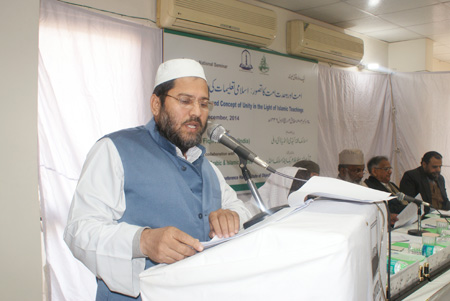
Speaker: Maulana Safdar Zubair Nadwi
Dr. Alam called upon Muslims to act but that should not be construed as confrontation. He remarked that though Muslims were equally strived to defend socialism and nationalism in the last century, the challenges posed by them had however fewer books to suggest their solution. He termed the 21st century as infertile as it failed to propound an ideology that could lead humanity. Barring the Quran, many religions had undergone change prompting us to speak not only for Muslims, but also for the entire human species. He urged religious leaders of the community to convey the message of Islam to the marginalised sections of society.
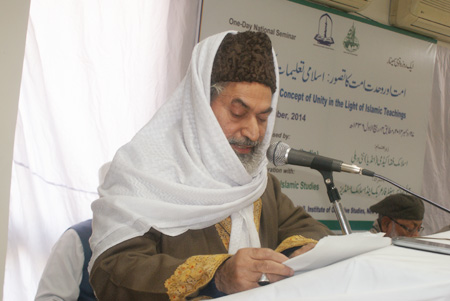
Speaker: Maulana Yaqoob Qadri
He considered ignorance and penury as our greatest enemies and called for launching a crusade against them. He sought to know why the discussion at the seminar involved different schools of thought. He especially made a call to Islamic scholars to forge unity among themselves. He believed that this could be a point from where the beginning of the programme could be made.
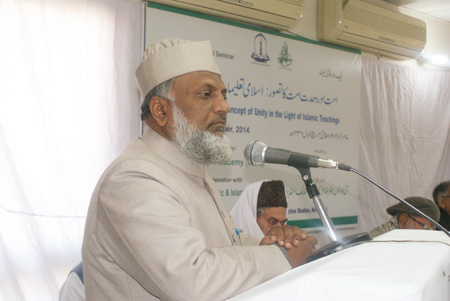
Speaker: Prof. Saud Alam Qasmi
Explaining the relationship between unity and Islam, Prof. of Theology at Aligarh Muslim University, Prof. Saud Alam Qasmi said that the expections of unity were different from the expectations of Islam. Making his point clear, he said that when we talked of unity between Shias and Sunnis, it would mean unity. But, when we talked of "matam" (mourning), it would concern Islam, he observed. He noted that an honest way out of this imbroglio would have to be found. He contended that the Quran laid more stress on wisdom than the speech and the genesis of the problem lay in the speech. He opined that Islam would make headway in India only if a proper strategy was devised. He clarified that while the Quran had exhorted believers of all the revealed Books to unite on the basis of one God (Allah), non-believers had been urged to unite on the basis of their social work.
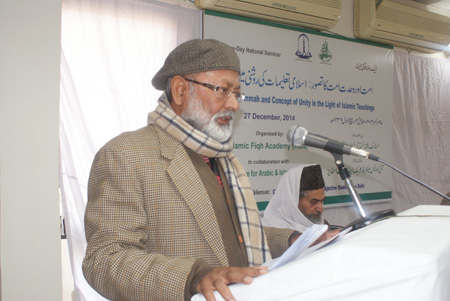
Speaker: Dr. M. Manzoor Alam
The Secretary of Islamic Fiqh Academy, Amin Usmani, quoting the noted Islamic scholar Dr. Taha Jabir al-Alwani, said that the present curriculum of madarsas was responsible for the prevailing state of affairs in the Muslim world. Explaining it he said that these madarsas produced imams, khatibs (preachers), quazis, etc., who differed in their approach to Islam. He opined that unless consensus on various issues was reached, no worthwhile purpose would be served. He stressed that a religious leadership would have to be evolved with sincerity, good intention and a firm resolve for moving ahead. Unity without this was doomed to failure, he concluded.
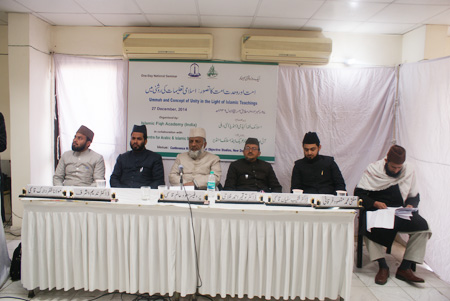
L-R: Maulana Zafar Darak Qasmi, DR. Nadeem Ashraf, Prof. Saud Alam Qasmi, Dr. Tawqeer Alam Falahi, Dr. Shakeb Sufyan Qasmi, Mufti Mohammad Maqsood Furqani
Mufti Mohammad Maqsood Furqani from Rampur laid emphasis on the need for a dialogue at the level of the different schools of thought for the unity of the ummah. Maulana Munsif Qasmi from Amroha opined that difference of opinion did not come in the way of unity. Dr. Shakib Sufiyan Qasmi from Deoband threw light on the unity of the Ummah, Quranic verses, Hadith and Sunnah. Dr. Tauqeer Ahmed Falahi from Aligarh spoke on "Dissensions in the Ummah: A big challenge". Dr. Nadeem Ashraf from Aligarh focused on unity in a divided society and the concept of unity. Maulana Zafar Darak presented his paper on the unity of the Ummah and a dialogue among the different schools of thought. Maulana Arshad Farooqui from Deoband dealt with difficulties in the way of unity. Dr. Junaid Haris from Delhi spoken on the need for a dialogue among different schools of thought for the unity of the Ummah and Maulana Inamullah Falahi, also from Delhi, discussed the role of Muslim organisations in the unity of the Ummah in India.
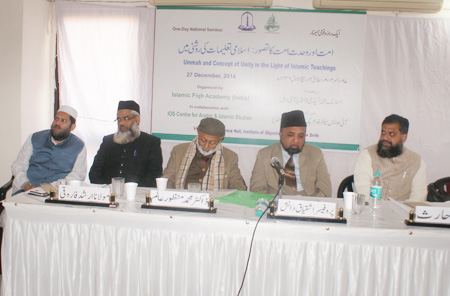
L-R: Maulana Safdar Zubair Nadwi, Maulana Arshad Farooqui, Dr. Mohammad Manzoor Alam, Prof. Ishtiyaque Danish, Maulana Haris Junaid
The seminar opened with recital of a Quranic verse by Hafiz Mohammad Athar Husain Nadvi. While the Secretary-General of the IOS, Prof. Z M Khan presented the welcome address, Dr. Nakhat Husain Nadvi conducted the proceedings. The symposium was attended by a large number of Islamic scholars and intellectuals.
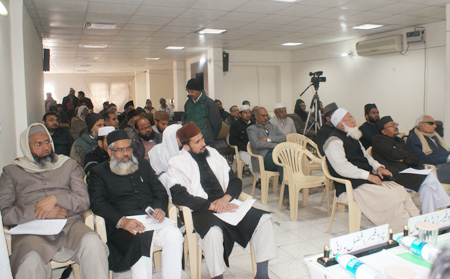
A view of audience
Go Back